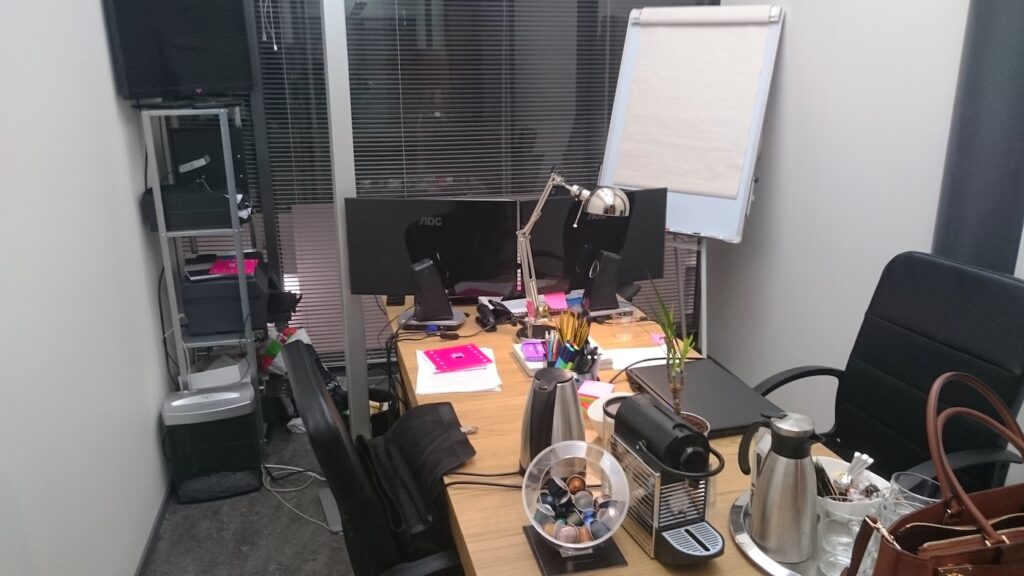I don’t want to do this.
This can’t be happening.
My finger hovered over my dark silver MacBook pro’s touchpad, hesitant to press the return button.
“Is this really it?” I felt empty.
I don’t remember the last time I felt so clueless. I’ve always been able to pull a rabbit out of a hat, like some kind of twisted version of David Copperfield. I’m an entrepreneur for god’s sake. My job is to solve problems, not create them.
But my mind was empty. I was empty.
Then it happened.
I watched as my finger touched the touchpad’s electric surface and commanded mac’s cursor to activate that snippet of code, we call buttons.
Click. There.
I just made over 300,000 thousand euros worth of debt personal. Just like that, the company I spent years building, was gone. Just like that, I had to file for bankruptcy.
By clicking that tiny button, I entered a whole new world. One where I would be chased after and free-fall through society’s safety nets. Now, for the first time in my life, I really was alone.
Why we need failures
Thinking about stopping something, or doing something or going somewhere is easy. But, when you actually execute it, it’s hard- it’s really, really hard.
But why is it so hard? Why do our stomachs ache and our heads feel dizzy?
It’s because of that fear. The fear of failure.
I once read about an experiment, where scientists wanted to see if they could create the perfect environment to grow trees in.
So, they built a huge glass biodome and planted the seedlings.
At first, everything seemed fine. The saplings got water and sun. The trees started to grow. However, then something strange happened. Before they reached the dome’s glass ceiling, they started to mysteriously topple over.
Every single one of them.
A long story short, the scientists finally figured out the reason. It was the lack of wind.
There was no wind inside the dome. Without the wind, the roots of the trees were unable to grow as strong and sturdy as needed to carry the weight of the trees.
So, it was, they toppled over.
See, this is the thing with failures. Just like trees need wind to grow strong, we need failures to thrive and well, ultimately survive.
But I know, it’s easier said than done.
How to Fall in Love with Failures
We all know that failures are learning opportunities. However, you might be asking yourself, how do I fall in love with failing?
Well, here’s a little realization that helped me fall in love with failing a few years back.
It all started with understanding why are we afraid of failures in the first place.
The culprit? Our ego.
Remember all the things you’ve dreamed of doing? All the ideas you had and how excited you first felt? And then what happened? You started to rationalize your dreams and quickly realized what would happen if it didn’t work out after all. If you failed. You’d be the laughing stock or the cautionary tale for others. You tried something and failed miserably. You left your corporate job and went back to school or worse, you became a failing entrepreneur.
Everyone tried to warn you, but no, you didn’t listen. Look at you now, you’re broke, abandoned, and sad.
You’re an outcast.
It is no wonder that after those kinds of thoughts, we’re ready to reconsider taking action. So, if it is the ego that is in the way, how can we get rid of it?
Well, the answer is, thinking like a scientist.
See, in the academic world, researchers anticipate repeated failures prior to success. It is for this reason, they set goals, create hypotheses, run tests and analyze results. Then they tweak their tests and run them again. Eventually, they discover the right way and the results shock the world.
In other words, a failing scientist, is a good scientist.
The mistake is not in you but in the way you do things. Hence, if you approach failures with the mindset of a scientist, your ego remains safe and you’re able to discover the right way to go about things.
In other words, when you take away the anger and pain, all the frustrations and shame, and observe failures objectively without your feelings in the way, you realize how vital failures actually are.
In hindsight and observed from afar, this sounds obvious, but when you are standing on the edge of the cliff, staring into the abyss, you begin to conjure up all these excuses why you shouldn’t jump.
Deep down in your gut, you know the right thing to do.
Being deeply in love with failures, makes it easier to follow your gut. Tough times won’t last forever but tough people will. But you can’t become tough if you keep avoiding failures…
Bankruptcy: What did I learn?
I feel shame when I look back on those days.
I knew for far too long, I wasn’t raising a child, but a monster.
That company and the environment were killing me both mentally and physically. I came to the point where my heart wouldn’t stop racing. I became so stressed that I would feel dizzy multiple times a day. I gained a lot of weight and what’s worse is my jokes became SO dark, even my friends had to pull me aside to tell me to calm down because I wasn’t fun to be around anymore.
However, perhaps the worst thing that happened is I started to have this feeling that if I continued on this path, my life would end sooner rather than later.
I knew I had to stop.
In this case, I didn’t have to think about jumping, I was pushed right over the ledge.
But you know what? This time, I felt relieved.
In a strange way, whilst I was falling, I felt at home again.
Finally, I was forced to go onwards in my life. Finally, I was so broke I had to sell everything and move abroad. Finally, I was learning again.
Today, I am actually happy. I’m almost stress-free and to my surprise, I am earning more than I ever have before.
My heart stopped racing and I started to lose some weight.
I’ve always wanted to live abroad and finally, I am. My friends even say I’m funny again.
So right now, today, I not only know that I am stronger and I will survive, but I also know that I am finally on my path to success.
With love, Mikael Hugg


